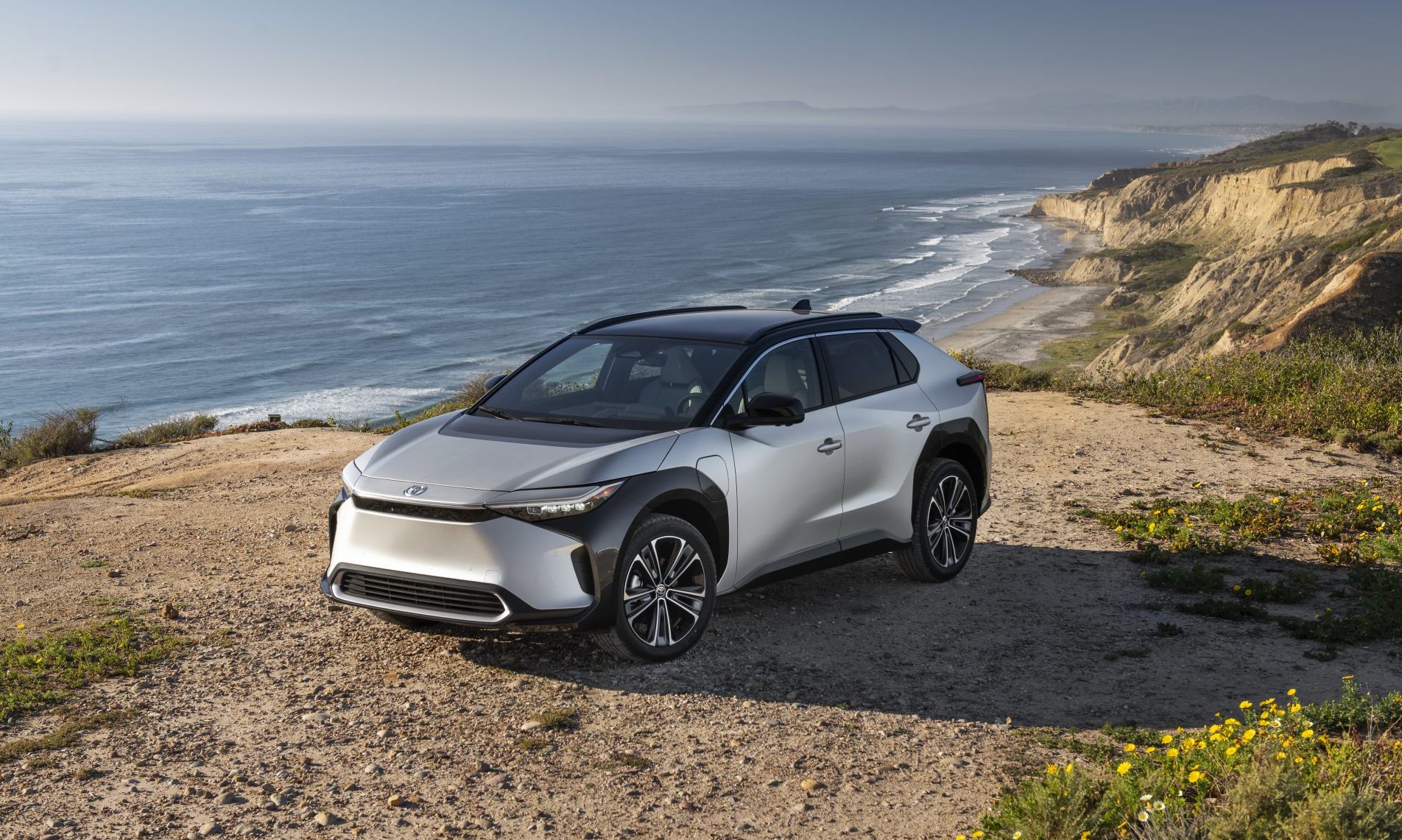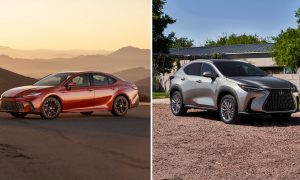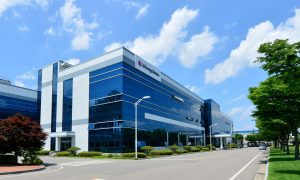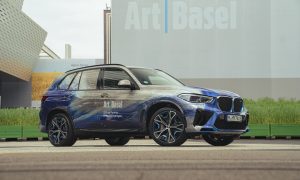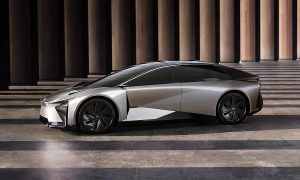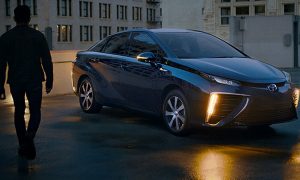Toyota has had a long history of speaking out against an all-out transition to electric vehicles (EVs), continually pointing to hydrogen technology and continued gas vehicle production as important pieces of the puzzle. In a recent statement, a Toyota chairman referenced a new project for the automaker, and while he didn’t share details, he did emphasize how hybrids and internal combustion engines (ICE) “still play a role” in reaching carbon neutrality goals.
After Toyota boosted its 2025 battery-electric vehicle (BEV) production forecast in November, the company later that month said that it expects to produce more hydrogen cars than its recently announced solid-state EVs by 2030. On Friday, former Toyota CEO and current chairman Akio Toyoda said that the automaker has gained approval from executives to start a project to “promote engine development anew,” with messaging on high-performance ICEs expected to play a big role for the company in 2024, according to Automotive News.
“There is still a role for engines as a practical means of achieving carbon neutrality,” Toyoda said on Friday during the Tokyo Auto Salon conference. “So, let us refine engine technology.”
Toyoda says that he was given approval from current Toyota CEO Koji Sato and other members of the executive body to follow through on the project. While he didn’t provide any further details on the initiative, he reiterated themes around BEV adoption that he has echoed through much of his career, highlighting hydrogen and the need for a smooth social shift to electrification.
“Battery electric vehicles do not represent the only way to achieve carbon neutrality,” Toyoda added. “Should we not all have enthusiasm for cars as we take on the challenge.”
Through advanced combustion engine development, Toyota still hopes to help fight carbon emissions while also helping to preserve jobs for those currently in ICE manufacturing, according to Toyoda. He said that many of the roughly 5.5 million people in Japan’s important automotive sector currently rely on part production for ICE vehicles.
“These people support Japan and have the skills to make the Japan of tomorrow strong. We must never lose these people,” Toyoda said. “To all those who have made engines up until now, let us continue to make engines… I will never let all the work you have all done so far go to waste.”
Toyota has had a fairly long history of vouching for a gradual transition to battery electric tech, and generally holding off on an “EV-only” approach to electrification—despite being the hybrid pioneer that developed the Prius.
In May, Toyota sent a document to dealerships highlighting what the company considered three major barriers to widespread BEV adoption. Toyota wrote that the first major barrier was the impossible demand for critical minerals needed to make EV batteries, while the lack of charging infrastructure and affordability were the other two.
The document elicited a response from Tesla Vice President of Investor Relations Martin Viecha, who debunked the claims, saying, “How is this a real document?”
1. Less mining/extraction is needed in renewable economy due to no fossil fuel extraction
2. Your car is fully charged every morning, so fast charging needs are limited, yet widely available
3. Model 3 costs ~$37.5k post EV creditHow is this a real document?
— Martin Viecha (@MartinViecha) May 30, 2023
In 2021, a New York Times report also depicted how a Toyota executive had lobbied against an aggressive electrification strategy in a meeting with U.S. congressional staff, as part of larger, worldwide efforts to reject stricter regulations in the U.S. the European Union, the United Kingdom, Japan, India, and Australia, among others still. The automaker’s slow-paced approach to electrification was also defended by the White House last year.
What are your thoughts? Let me know at zach@teslarati.com, find me on X at @zacharyvisconti, or send your tips to us at tips@teslarati.com.
News
Tesla cleared in Canada EV rebate investigation
Tesla has been cleared in an investigation into the company’s staggering number of EV rebate claims in Canada in January.

Canadian officials have cleared Tesla following an investigation into a large number of claims submitted to the country’s electric vehicle (EV) rebates earlier this year.
Transport Canada has ruled that there was no evidence of fraud after Tesla submitted 8,653 EV rebate claims for the country’s Incentives for Zero-Emission Vehicles (iZEV) program, as detailed in a report on Friday from The Globe and Mail. Despite the huge number of claims, Canadian authorities have found that the figure represented vehicles that had been delivered prior to the submission deadline for the program.
According to Transport Minister Chrystia Freeland, the claims “were determined to legitimately represent cars sold before January 12,” which was the final day for OEMs to submit these claims before the government suspended the program.
Upon initial reporting of the Tesla claims submitted in January, it was estimated that they were valued at around $43 million. In March, Freeland and Transport Canada opened the investigation into Tesla, noting that they would be freezing the rebate payments until the claims were found to be valid.
READ MORE ON ELECTRIC VEHICLES: EVs getting cleaner more quickly than expected in Europe: study
Huw Williams, Canadian Automobile Dealers Association Public Affairs Director, accepted the results of the investigation, while also questioning how Tesla knew to submit the claims that weekend, just before the program ran out.
“I think there’s a larger question as to how Tesla knew to run those through on that weekend,” Williams said. “It doesn’t appear to me that we have an investigation into any communication between Transport Canada and Tesla, between officials who may have shared information inappropriately.”
Tesla sales have been down in Canada for the first half of this year, amidst turmoil between the country and the Trump administration’s tariffs. Although Elon Musk has since stepped back from his role with the administration, a number of companies and officials in Canada were calling for a boycott of Tesla’s vehicles earlier this year, due in part to his association with Trump.
News
Tesla Semis to get 18 new Megachargers at this PepsiCo plant
PepsiCo is set to add more Tesla Semi Megachargers, this time at a facility in North Carolina.

Tesla partner PepsiCo is set to build new Semi charging stations at one of its manufacturing sites, as revealed in new permitting plans shared this week.
On Friday, Tesla charging station scout MarcoRP shared plans on X for 18 Semi Megacharging stalls at PepsiCo’s facility in Charlotte, North Carolina, coming as the latest update plans for the company’s increasingly electrified fleet. The stalls are set to be built side by side, along with three Tesla Megapack grid-scale battery systems.
The plans also note the faster charging speeds for the chargers, which can charge the Class 8 Semi at speeds of up to 1MW. Tesla says that the speed can charge the Semi back to roughly 70 percent in around 30 minutes.
You can see the site plans for the PepsiCo North Carolina Megacharger below.

Credit: PepsiCo (via MarcoRPi1 on X)

Credit: PepsiCo (via MarcoRPi1 on X)
READ MORE ON THE TESLA SEMI: Tesla to build Semi Megacharger station in Southern California
PepsiCo’s Tesla Semi fleet, other Megachargers, and initial tests and deliveries
PepsiCo was the first external customer to take delivery of Tesla’s Semis back in 2023, starting with just an initial order of 15. Since then, the company has continued to expand the fleet, recently taking delivery of an additional 50 units in California. The PepsiCo fleet was up to around 86 units as of last year, according to statements from Semi Senior Manager Dan Priestley.
Additionally, the company has similar Megachargers at its facilities in Modesto, Sacramento, and Fresno, California, and Tesla also submitted plans for approval to build 12 new Megacharging stalls in Los Angeles County.
Over the past couple of years, Tesla has also been delivering the electric Class 8 units to a number of other companies for pilot programs, and Priestley shared some results from PepsiCo’s initial Semi tests last year. Notably, the executive spoke with a handful of PepsiCo workers who said they really liked the Semi and wouldn’t plan on going back to diesel trucks.
The company is also nearing completion of a higher-volume Semi plant at its Gigafactory in Nevada, which is expected to eventually have an annual production capacity of 50,000 Semi units.
Tesla executive teases plan to further electrify supply chain
News
Tesla sales soar in Norway with new Model Y leading the charge
Tesla recorded a 54% year-over-year jump in new vehicle registrations in June.

Tesla is seeing strong momentum in Norway, with sales of the new Model Y helping the company maintain dominance in one of the world’s most electric vehicle-friendly markets.
Model Y upgrades and consumer preferences
According to the Norwegian Road Federation (OFV), Tesla recorded a 54% year-over-year jump in new vehicle registrations in June. The Model Y led the charge, posting a 115% increase compared to the same period last year. Tesla Norway’s growth was even more notable in May, with sales surging a whopping 213%, as noted in a CNBC report.
Christina Bu, secretary general of the Norwegian EV Association (NEVA), stated that Tesla’s strong market performance was partly due to the updated Model Y, which is really just a good car, period.
“I think it just has to do with the fact that they deliver a car which has quite a lot of value for money and is what Norwegians need. What Norwegians need, a large luggage space, all wheel drive, and a tow hitch, high ground clearance as well. In addition, quite good digital solutions which people have gotten used to, and also a charging network,” she said.
Tesla in Europe
Tesla’s success in Norway is supported by long-standing government incentives for EV adoption, including exemptions from VAT, road toll discounts, and access to bus lanes. Public and home charging infrastructure is also widely available, making the EV ownership experience in the country very convenient.
Tesla’s performance in Europe is still a mixed bag, with markets like Germany and France still seeing declines in recent months. In areas such as Norway, Spain, and Portugal, however, Tesla’s new car registrations are rising. Spain’s sales rose 61% and Portugal’s sales rose 7% last month. This suggests that regional demand may be stabilizing or rebounding in pockets of Europe.
-

 Elon Musk2 weeks ago
Elon Musk2 weeks agoTesla investors will be shocked by Jim Cramer’s latest assessment
-

 Elon Musk2 days ago
Elon Musk2 days agoxAI launches Grok 4 with new $300/month SuperGrok Heavy subscription
-

 Elon Musk4 days ago
Elon Musk4 days agoElon Musk confirms Grok 4 launch on July 9 with livestream event
-

 News1 week ago
News1 week agoTesla Model 3 ranks as the safest new car in Europe for 2025, per Euro NCAP tests
-

 Elon Musk2 weeks ago
Elon Musk2 weeks agoA Tesla just delivered itself to a customer autonomously, Elon Musk confirms
-

 Elon Musk1 week ago
Elon Musk1 week agoxAI’s Memphis data center receives air permit despite community criticism
-

 News2 weeks ago
News2 weeks agoXiaomi CEO congratulates Tesla on first FSD delivery: “We have to continue learning!”
-

 News2 weeks ago
News2 weeks agoTesla sees explosive sales growth in UK, Spain, and Netherlands in June

